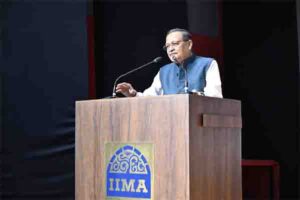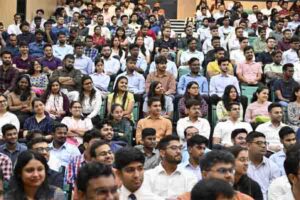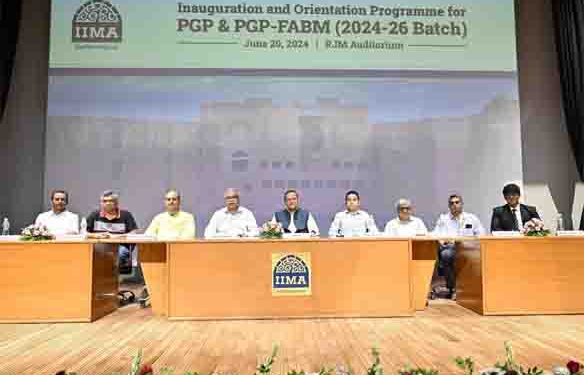- 404 students join the PGP and 47 the FABM programme, with average work experience of 26 months
- About 39 percent of the PGP batch comprises students from non-engineering disciplines and 61 percent from engineering disciplines
- A significant number of differently abled students have joined the PGP Class of 2023-2025
NE EDUCATION BUREAU
AHMEDABAD, JUNE 23
The Indian Institute of Management Ahmedabad (IIMA) on Friday welcomed a total of 451 high-performing students to the class of 2024-2026 of two of its top-ranked management education programmes on Thursday. The 61st batch of the Two-Year Full Time Post Graduate Programme in Management (PGP) comprises a total of 404 meritorious students and the 25th batch of the Two-Year Full Time Post Graduate Programme in Food and Agribusiness Management (PGP-FABM) has 47 students, all of whom have come from diverse backgrounds from across the country.

Delivering the inaugural address, Professor Bharat Bhasker, Director, IIMA said, “You have chosen a transformational journey towards your growth and learning that will prepare you to sail through the uncertainties and challenges of your career successfully. IIMA is known for its academic excellence, rigorous curriculum, as well as thought leadership; and all this is possible because of our exceptional faculty, who are always striving to acquire and create new knowledge and disseminate it to you.”

Describing the incoming students as changemakers and encouraging them to learn from collaborative competition, Professor Bhasker said, “All of you have excelled in various fields and each one of you has something to offer others. So, ensure that you are able to derive knowledge from each other and grow together through collaborative competition of the brightest minds. Remember that you all are the changemakers that will propel India to new growth with your leadership in an increasingly transitory period that we are witnessing today. Don’t deter, take everything in your stride, and form deeper and longer bonds within this vibrant community that will stay with you for a lifetime. I am sure that all of you are going to come out as daunting lions, like your predecessors, and make a mark in various fields.”
Delivering the welcome address, Professor Diptesh Ghosh, Dean (Programmes), IIMA, said, “The PGP and PGP-FABM are among the oldest and top-rated MBA programmes in the country, and they have been tailored from time to time to transform you as some of the best management leaders. For the same reason, they are also extremely demanding and competitive so that you learn to deal with new subjects and challenges of your professional journey without getting affected. While you hone your managerial skills through the pioneering case methodology, we hope that you also learn to strike a balance between curricular and extracurricular activities and build your network.”
Sharing a set of advice with the new students, Professor Ankur Sinha, Chairperson, PGP, IIMA, said, “This is the beginning of a new chapter in your life which is going to be a transformational journey that you will cherish for the rest of your life. Even if it seems like a long period, these two years will fly by, and so, while you are here, assimilate learning, make friends, and create future opportunities for yourself. Be courteous, humble, and respectful in your words and feelings as every individual around you has a different set of skills and intelligence which you might not have. Learn to work in teams and pay attention to other’s viewpoints as it will help develop multiple dimensions of your personality. The IIMA brand is going to take you higher and higher, so combine it with your honest efforts and capabilities to climb the ladder of success.”
Professor Vineet Virmani, Chairperson, PGP-FABM, IIMA, said, “The PGP-FABM is one of the oldest long-duration management programmes of the Institute and it has been reincarnated over the years to meet industry needs. It is natural for you to feel anxious at this stage of your life, but we are confident that all of you are capable enough to conquer new heights. I welcome you to IIMA and hope that you will exceed our expectations through your academic performance and professional accomplishments.”
Diversity and Inclusivity
Diversity remains one of the core requirements for student intake at IIMA as it enhances class discussions, enriches peer interaction by providing everyone with the opportunity to learn and accept diversity in views and practices, explores different perspectives towards problem-solving, and creates a more holistic learning environment, making them ready to manage real-world situations.
Out of 404 meritorious students from a diverse educational, professional, socio- economic and gender backgrounds in the PGP Class of 2024-26, about 25 percent are women students, as compared to about 23 percent last year. About 39 percent of the batch comprises students from non-engineering disciplines and 61 percent from engineering. The new batch of PGP consists of 29 percent freshers and about 71 percent experienced candidates having a range of skills and work experience in sectors such as Consulting, Banking and Financial Services, Public Sector Units, Pharmaceuticals/Healthcare, Information Technology, etc.
The PGP-FABM batch has 47 students, out of which around 36 percent are women students. All 47 students are hailing from food and agribusiness backgrounds.
While the average age of students remains 23 in both the programmes, the average work experience has increased to 26 months in PGP and 27 months in PGP-FABM programmes as compared to 21 months and 19 months, respectively, during the previous year.
A significant number of differently abled students have joined the PGP Class of 2023-2025. The Institute has always advocated the concept of inclusive education and has set up an EOO (Equal Opportunity Office) that collaborates with these students to understand their special needs and provides several facilities, including Apple iPads, automotive wheelchairs, specialised software, high-resolution cameras for laptops, and any other specific requirements they may have during their student life on campus.
Professor Karthik Sriram, Chairperson (Admissions); Professor Viswanath Pingali, Chairperson (Placements); Professor Naman Desai, Chairperson (Student Housing, Activities, and Welfare Committee); Professor Rajat Sharma, Chairperson, Sports and Recreation Activities Committee (SARA); Atman Soni, General Secretary (Student Affairs Council); and other faculty and staff members were present to welcome and interact with the incoming students.












